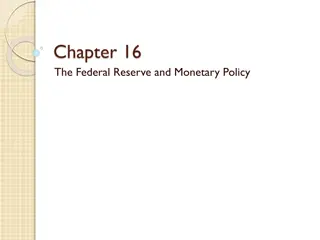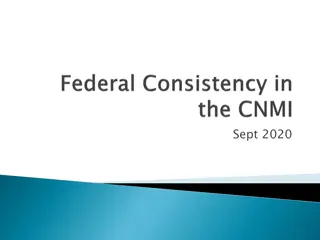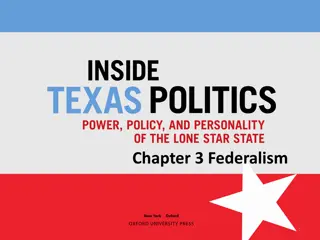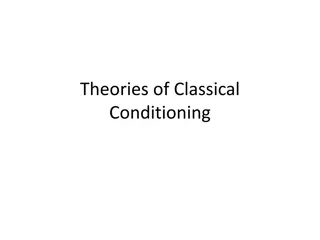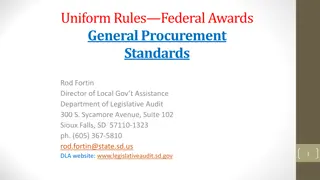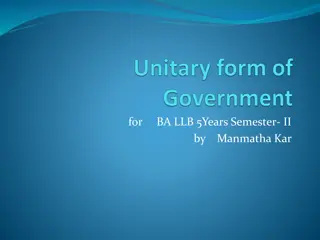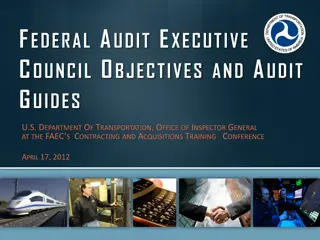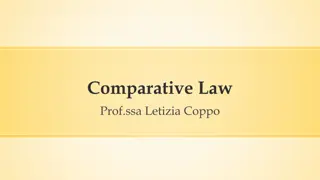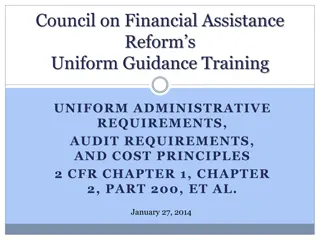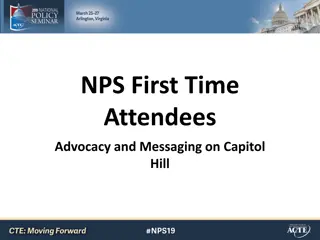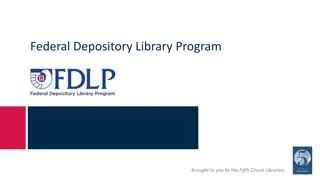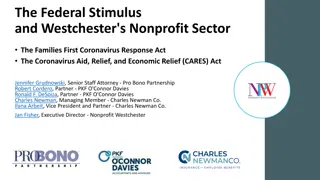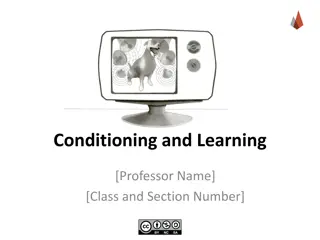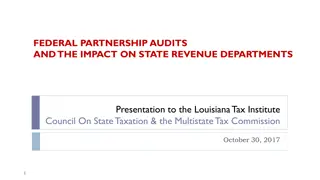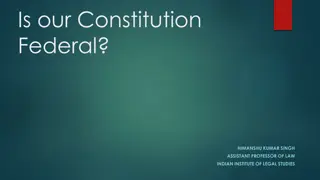Military & Overseas Voting: Special Forms and Deadlines Explained
Military and overseas voters have special forms and deadlines under the Uniformed and Overseas Citizens Voting Act (UOCAVA) and the Military & Overseas Voters Act (MOVE). These laws allow these voters to register and vote absentee in federal elections using forms like the Federal Post Card Applicati
0 views • 25 slides
Federal Grant Funding: Uniform Guidance for Procurement of Goods or Services
When purchasing goods or services, especially with federal grant funding, the process is subject to the Federal Uniform Guidance (UG) and University procurement procedures. The UG outlines different thresholds for procurement, such as Micro-Purchase, Small Purchase, and Competitive Formal Solicitati
0 views • 30 slides
Understanding Strength-Duration (SD) Curve: A Neuromuscular Diagnostic Test
Strength-Duration (SD) curve is a diagnostic test assessing neuromuscular integrity by measuring the relationship between stimulus strength and duration. It helps in electro-diagnosis of peripheral nervous system disorders and evaluates nerve degeneration and regeneration. The curve is obtained by p
2 views • 17 slides
Understanding the Federal Reserve System and Monetary Policy
Delve into the history, structure, and functions of the Federal Reserve System, including its role in implementing monetary policy to stabilize the economy. Explore the establishment of the Federal Reserve Act of 1913, the structure of the Federal Reserve, and its pivotal role in serving the governm
0 views • 35 slides
Understanding Federal Consistency in Coastal Zone Management
This presentation serves as an introduction to Federal Consistency in the context of Coastal Zone Management, emphasizing the importance of compliance with enforceable policies outlined in the Coastal Zone Management Act. It highlights the role of the Division of Coastal Resources Management (DCRM)
1 views • 13 slides
Understanding 18 U.S.C. 209 and Its Impact on VA Research Personnel
DOJ guidance has clarified the application of 18 U.S.C. 209 to VA employees receiving compensation from non-Federal entities for research. This law prohibits Federal employees from receiving any form of compensation from non-Federal entities for services expected as Government employees. The webinar
0 views • 20 slides
Understanding Stimulus Control in Behavioral Psychology
Stimulus control plays a crucial role in determining behavior based on the presence or absence of stimuli. It influences responses through discrimination and generalization processes, shaping behavior patterns. By understanding stimulus control, we can explore how antecedent stimuli affect responses
0 views • 57 slides
Understanding Stimulus Control in Behavior
Behavior under stimulus control means its occurrence is influenced by the presence of certain stimuli. This principle explains how the likelihood of a behavior happening depends on specific cues in the environment. When a behavior is under stimulus control, it is more likely to occur in the presence
6 views • 56 slides
Understanding Federalism in the United States
Explore the different types of governmental systems and the distribution of power between the federal and state governments. Learn about the advantages of federalism, how Texas utilizes federal funding, and the evolution of cooperation and coercion within the federal system over time. Dive into conf
7 views • 17 slides
Theories of Classical Conditioning: Critical Concepts and Pavlov's Stimulus Substitution Theory
Understand the key aspects of classical conditioning, including the critical CS-US relationship and Pavlov's Stimulus Substitution Theory. Explore why organisms respond predictably, uncover criticisms and flaws in the theory, and delve into the bigger problem of selecting for certain conditioned res
0 views • 75 slides
Understanding Stimulus Control in Behavior
Stimulus control refers to the influence of stimuli on behavior. When a behavior is under stimulus control, it occurs in the presence of certain stimuli and not in their absence. This concept is crucial in understanding how behaviors are triggered and maintained based on the presence or absence of s
2 views • 56 slides
Understanding Federal Awards Procurement Standards
Explore the Uniform Rules-Federal Awards Procurement Standards under 2 C.F.R., addressing common federal findings, state versus non-federal entities, and state compliance requirements. The information provided delves into the purpose of procurement standards and the importance of adhering to federal
1 views • 48 slides
Comparison of Unitary and Federal Government Systems
This presentation compares unitary and federal government systems, highlighting differences in the number of governments, constitution type, flexibility, division of powers, supremacy of constitution, judiciary independence, and legislative structure. It explains how unitary governments have a singl
0 views • 7 slides
Potential Impact of Fiscal Stimulus on the US Economy: Insights by Jeffrey Frankel
Jeffrey Frankel, Harpel Professor at Harvard University, discusses the likelihood of the US economy overheating due to recent fiscal stimulus measures. He highlights the significant relief packages passed by Biden, potential GDP increases, and the possibility of GDP surpassing its potential, raising
1 views • 16 slides
EU Fiscal Policy in the Midst of the Pandemic: Rule or Exception?
Amidst the COVID-19 pandemic, the EU implemented a fiscal response involving a significant stimulus package and freezing of the Stability and Growth Pact. The link between the stimulus and freezing is crucial, supported by Council's recognition of exceptions for excessive deficits. Data on governmen
0 views • 23 slides
Federal Employment of Individuals with Disabilities Overview
This detailed content highlights the efforts of recruiting, retaining, and honoring federal employees with disabilities, focusing on Executive Order 13548 aiming to enhance employment opportunities for individuals with disabilities. It also provides historical data on disability new hires and the pe
0 views • 49 slides
Federal Audit Executive Council - Contract Closeout Guide Highlights
The Federal Audit Executive Council (FAEC) plays a vital role in coordinating issues affecting the Federal audit community, with a key emphasis on audit policy and operations. The FAEC's contracting committee has developed audit guides covering various topics like acquisition planning, market resear
1 views • 12 slides
Understanding the Federal System in American Law
The American legal system is rooted in a division of powers between the States and the Federal government. Federal law fills gaps and complements State laws, with Federal courts having jurisdiction over disputes involving different States or Federal issues. The Constitution and Bill of Rights protec
0 views • 23 slides
Understanding Federal Fund Exchange Training Program
The Federal Fund Exchange program allows Local Public Agencies to exchange federal obligation authority for state funds, reducing time-consuming federal-aid project requirements. Benefits include flexibility in project selection, wider scopes, and avoiding restrictive federal provisions. Eligible pr
0 views • 27 slides
Reforms to Administrative Requirements under Uniform Guidance Training
The Council on Financial Assistance Reform's Uniform Guidance Training focuses on changes to administrative requirements, audit requirements, and cost principles under 2 CFR Chapter 1, Chapter 2, Part 200, and more. Major changes include updates to Circular A-102, A-110, and A-89 affecting grants, c
0 views • 62 slides
Overview of Federal Advisory Committee on Insurance
The Federal Advisory Committee on Insurance (FACI) operates under the Federal Advisory Committee Act (FACA) to provide advice and recommendations to the Federal Insurance Office (FIO). The FACI Charter guides its objectives, representative members, and responsibilities, ensuring ethical standards ar
0 views • 13 slides
Advocacy and Messaging Strategies in Federal Education Policy
Exploring the importance of advocacy and lobbying in federal education policy, this content covers topics such as the legislative process, notable CTE priorities, federal funding authorization, and appropriations. It highlights the role of federal advocacy in shaping education policies, influencing
0 views • 29 slides
NARFE Membership: Protecting Federal Benefits & Enhancing Retirement Security
NARFE, the association for federal employees and retirees, is dedicated to safeguarding federal workers' benefits and providing valuable resources for maximizing their retirement savings. Through advocacy and informational resources, NARFE helps federal employees navigate changes in federal policies
0 views • 11 slides
Federal Depository Library Program: Providing Access to Government Information
The Federal Depository Library Program (FDLP) offers free government materials to libraries, ensuring public access to federal information. Established in 1813, the program disseminates resources across 1150 federal libraries, promoting transparency and accountability. Selective depository libraries
0 views • 20 slides
Overview of the Federal Structure in the Constitution of India
The Constitution of India showcases a quasi-federal system with a strong centralizing tendency, as discussed by scholars like Kenneth C. Wheare, Sir Ivor Jennings, and Dr. B. R. Ambedkar. The essential features of a federal constitution, such as division of power, supremacy of law, and distribution
0 views • 4 slides
Municipal Finance System in the Federal Republic of Germany: Thuringia Example
The presentation outlines the municipal finance system in the Federal Republic of Germany, using Thuringia as an example. It covers tax revenue, key allocations to municipalities, fiscal equalization, and the structure of the federal and state governments. Various taxes, including federal, municipal
0 views • 12 slides
Understanding the Federal Stimulus Impact on Westchester's Nonprofit Sector
Explore the implications of the Families First Coronavirus Response Act and the CARES Act on Westchester's nonprofit sector. Gain insights from key presenters and sponsors, and learn about employment provisions under these acts. Disclaimer: This presentation does not constitute legal advice.
0 views • 55 slides
Federal Reporting Entity Update: Highlights from FASAB Review
Explore the latest updates from the Federal Accounting Standards Advisory Board (FASAB) review, including insights on the reporting model, risk considerations, assumed leases, and public-private partnerships. Learn about the significant changes in federal financial reporting entities and the impleme
0 views • 25 slides
Understanding Classical Conditioning: Pavlov's Experiment and Responses
Explore the principles of classical conditioning through Pavlov's experiment, including the types of responses like conditioned emotional reactions. Learn about the components of classical conditioning such as unconditioned stimulus and response, conditioned stimulus and response, and how the proces
0 views • 42 slides
Federal Bar Association: Strengthening the Legal System
The Federal Bar Association (FBA) is dedicated to enhancing the federal legal system and promoting justice through its support of federal practitioners, the judiciary, and the public. With over 17,000 members nationwide and a strong focus on community engagement and professional development, the FBA
0 views • 15 slides
Understanding Buy America Requirements in Federal Infrastructure Projects
This presentation provides an overview of the Buy America requirements as mandated by the Federal Highway Administration (FHWA) and outlined in the Bipartisan Infrastructure Law. The Buy America regulations apply to iron, steel, manufactured products, and construction materials, requiring that these
1 views • 20 slides
The Financing of Local Government in China: Stimulus Loan Trends and Shadow Banking Growth
This paper examines the financing of local government in China, focusing on the transition from bank loans to non-bank debt, particularly the upsurge of shadow banking from 2012 onwards. It explores the reasons behind the rapid growth of shadow banking activities in China, including the impact of th
0 views • 36 slides
Understanding Single Audit Requirements for Hawaii Child Nutrition Programs 2016
In accordance with federal regulations, non-Federal entities that expend $750,000 or more in Federal funds, including USDA's child nutrition programs, are required to undergo a Single Audit. The audit must be completed within nine months of the organization's fiscal year-end, and the final report mu
0 views • 5 slides
ASRC Federal: Supporting Indigenous Communities with a Commitment to Sustainability
ASRC Federal, a leading Alaskan-owned company, embodies a deep-rooted commitment to supporting Indigenous communities and preserving cultural values. Through partnerships with organizations like NOAA and a focus on environmental stewardship, ASRC Federal demonstrates a dedication to sustainability a
0 views • 11 slides
Nigeria COVID-19 Action Recovery and Economic Stimulus Programme - Results and Implications
The 3rd verification exercise of the NG-CARES Programme across 36 states and FCT revealed impressive results and implicated earnings. Implemented DLIs and earning details were scrutinized state-wise, showcasing progress and challenges faced in the recovery and economic stimulus efforts.
0 views • 8 slides
Understanding Federal Partnership Audits and Their Impact on State Revenue Departments
The presentation discusses the impact of federal partnership audits on state revenue departments, emphasizing how states benefit from federal audit efforts. It covers topics such as reporting federal audit adjustments, the background of federal audit adjustments, and the final determination process.
0 views • 51 slides
Shaping India's Green Recovery Through Energy Taxes and Stimulus
Explore the role of energy taxes and stimulus in shaping India's green recovery, including setting a net-zero emissions goal and understanding the implications of a just transition. Discover key policies for emissions reduction, potential impact on government revenue, and job creation through carbon
0 views • 5 slides
Georgia Legislative Session Recap and COVID Stimulus Update
The Georgia Legislative Session Recap and COVID Stimulus Update provides information on recent developments, including the American Rescue Plan impact in Georgia, COBRA subsidies for laid-off workers, and enrollment reopening for health coverage. Learn about eligibility criteria and how the subsidie
0 views • 12 slides
Understanding the Federal Features of the Indian Constitution
The Indian Constitution exhibits a unique blend of federal and unitary characteristics, termed as quasi-federal. This constitutional setup grants power to both the center and states, yet allows for central intervention in certain circumstances. The Parliament holds authority over creating new states
0 views • 4 slides
Financial Summary Board of Trustees Presentation Overview
The financial summary board of trustees presentation on May 19, 2022, highlighted March year-to-date financial data, federal funding support for higher education, liquidity, reserves, outlook, major revenue and expense categories, actual versus budget variances, hospital operating expenses, and fede
0 views • 15 slides



